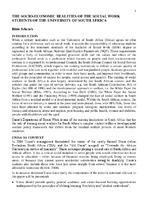| dc.description.abstract | Introduction: When a tertiary institution such as the University of South Africa (Unisa) agrees to offer training for a profession such as social work, it accepts the responsibility of educating students according to the minimum standards of the Bachelor of Social Work (BSW) degree as registered at the South African National Qualification Framework (NQF). These requirements include a body of knowledge, required practical skills and the values and ethics of the profession. Social work is a profession which focuses on people and their socio-economic context. It is regulated by its professional Council, the South African Council for Social Service Professions (SACSSP), which expects the training institutions to deliver a certain quality of professional who can work together with troubled and marginalised people, facilitate processes with groups and communities in order to meet their basic needs, and improve their livelihoods, based on the principles of respect for people, social justice and equality. The training of social workers in South Africa is also largely determined by the South African context and the policies that guide the type of service delivery, e.g. the South African Constitution, Bill of Rights (Act 108 of 1996) and the developmental approach to welfare, i.e. the White Paper for Social Welfare (RSA, 1997). According to Van Delft (2002), the White Paper for Social Welfare (1997) and the Financing Policy (1999) changed the face of social welfare in South Africa from a residual model to a developmental model. Within the South African context, the focus of service delivery is aimed at the poor and unemployed, those with HIV/Aids, those that have been affected by crime and violence, pregnant teenagers, malnutrition, low levels of literacy and education, abuse and neglect, poor housing and public health, women and children, people with disabilities and the aged. | en_US |

